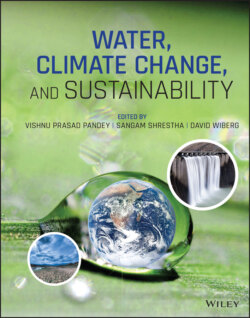Читать книгу Water, Climate Change, and Sustainability - Группа авторов - Страница 44
3.3.1. Energy Use and Supply
ОглавлениеBio‐based systems are both energy users and energy suppliers in the form of bioenergy. Energy supplied from bio‐based systems includes the calorific value of agricultural products, which can be converted to biogas, liquid biofuels, or solid energy materials, and finally to electricity. The life cycle of energy in bio‐based systems can be divided into three phases: background phase, agricultural crop production phase, and industrial phase. The background phase includes extraction and transportation of raw materials, production of agricultural supplies, such as fuel, machinery, fertilizers, pesticides, seed, as well as transportation of supplies to the local markets and farms. The agricultural crop production phase includes all the field operations, such as tillage, planting, fertilizer and pesticides application, harvest and post‐harvest logistics. Inputs for the agricultural crop production phase include seeds, chemical fertilizers, pesticides (including herbicides, fungicides and insecticides), fuel, lubricants, electricity, manure, water for irrigation, labor, and machinery. Farm operations require farm machines and equipment, such as tractors, cultivators, fertilizer spreaders, pesticide sprayers, harvesters, irrigation systems, and short‐distance transportation equipment. The industrial phase comprises processes in which agricultural products are converted to biofuels, which include transportation, storage, drying, grinding, cooling, heating, maintaining reaction conditions, and product separation.
Most of the energy used in bio‐based systems is derived from fossil fuels. Although part of the modern‐day electricity is produced from renewable sources, such as water, wind and solar, more than 73% of the world’s electricity is still produced from non‐renewable sources (REN21, 2018). The shares of renewable energy sources in heating and transportation sectors are at 27% and 3%, respectively. Since some of the main goals of bio‐based systems are to substitute petroleum‐based fuels and chemicals and to reduce the environmental impacts, it is important to evaluate the sustainability of a bio‐based system by considering the energy use and supply in the system.
